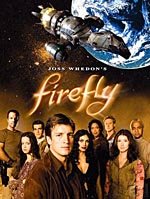 I once dated myself by mentioning offhand at a Star Trek Trek convention that I was one of the kids who saw the original series when it originally aired back in the ‘60s. All conversation around me stopped. Then one fellow looked at me quizzically and asked, “How old –are- you?”
I once dated myself by mentioning offhand at a Star Trek Trek convention that I was one of the kids who saw the original series when it originally aired back in the ‘60s. All conversation around me stopped. Then one fellow looked at me quizzically and asked, “How old –are- you?”It was an article of Trekkie religion at the time was that almost no one watched the original series (a claim since disproved) and that it revived only by being “discovered” by kids watching second hand teevees during ‘70s syndication. The original series aired in some mystical, long gone time, seen only by time travelers or someone’s grandparents. I wasn't old enough to be a granddaddy, so I must have just beamed in from 1967.
Trekkiers love the show in part because Star Trek set the tone for successful televised science fiction. You get your aliens, half-nekkid green (or blue) women and galactic conflicts between Clearly Good and Clearly Evil and you're off. Star Wars reached ridiculous heights of success because they pared it down to the bare essentials. Recent successes such as Farscape, Andromeda and Stargate finds the formula as good today as it ever was.
The problem is that it’s completely unscientific.
There’s little chance that we’ll find some easy way to zip around space faster than light in vessels seemingly immune to G forces.
There’s no requirement that our civilization can only reach this point must after having developed into an ideal, a la the Federation of Star Trek.
There’s almost no chance that we’ll find dozens of other humanoidish species who just happen to look like us, plus or minus a pointed ear or amplified forehead bone structure, at a technological level amazingly similar to ours.
The biigest reason we won't go bumping into Romulans, Vulcans, Klingons and Andorians out there is time. Carl Sagan drew this out well in his Cosmos series. If humans are any indication, it takes millions and millions of years to stand upright and invent the telephone. Any other race out there is either going to be thousands or millions of years behind us, meaning we’ll be talking to some form of proto-caveman at best; or thousands or millions of years ahead of us, which means us trying to open up conversation with them will be like us trying to make small talk with to an ant.
In short, when we go, there’s going to be nothing more out there to talk to except us.
The distances are so great that communication between solar systems will be sporadic at best. Those who leave Earth to set up colonies out there are leaving to set up whole new worlds, not “colonies” as Europeans put around Earth.
Also, as we certainly saw in Europe, migrating peoples and cultures don’t have to be perfect to decide to move over the next ocean or just the next hill. All they need is motivation and ‘I WANT LAND!!” seems good enough to go on.
So all my life I’ve waited for a TV series which would show the “real” future, real people living in an alien-free environment with all the usual human foibles and failures.
After decades of waiting, I finally got it in Firefly, which debuted in fall 2002. Unfortunately, it was too real and didn’t last past several months. (Maybe if they’d added some half-nekkid alien women …).
The show, in summary, was about a future human civilization (which removed the need for "warp drive" to get around) which has left a thoroughly trashed Earth for a much larger solar system which was terraformed to provide new living space. The more developed worlds coalesced into an Alliance. Thinking that it's wrong to keep a good thing to itself, these planets went on crusade to bring culture and light to the less developed outer colonized worlds, which wanted to go their own way, but needed to get civilized (according to the Alliance) whether they liked it or not. It was good for them.
The key cast members are survivors of the losing side, sort of rootless Confederates after the Civil War. The winning is cast as bad guys, but that’s through the eyes of the losers, like Rebs would see the Yanks in 1870.
But the Alliance is sorta bad, although its badness is hidden under an outward parliamentary democracy. It has a nasty bit of “black ops” arising out of and past the war which is fueled by a missionary zeal that representing the forces of light allows them to do just about any damn thing they want as long as it’s for the right purpose or goal.
Sound familiar?
Fox was leery from the start, according to the directors and all. It didn’t “grab” people quick enough, they said. They wanted, without saying it, half-nekkid women and gun battles to start with. "Grabbers."
The show was certainly action packed. But the appeal was the gradual revealing of the characters and the scenario, the grey area between good and evil based on perspective. There was no Darth Vader or Klingon horde. The Alliance wasn’t “good”, but the heroes weren’t really heroes either, just survivors. It was that moral ambiguity which made the show so damn appealing, along with the realistic scenario of human colonization. But Fox Network, for whom morality is a foreign concept, couldn’t get this and pulled the plug after just a few months.
Fortunately, there are conventions and even more fortunately, there is Netflix. This is a series worth watching. Check out the series, and then follow up with last year’s movie, Serenity, which brings many of the show’s developing themes to a head. This is must see teevee for thinking sci-fi fans.
In fact, half the fun is reading all the fan commentary on the various forums arguing over whether the show promotes socialist, libertarian or conservative values. There's plenty of ammunition (no pun intended) for any, all or none.
There’s talk of it being picked up by Sci-Fi Channel or maybe teevee movies. I dunno. The movie added some twists to the story which will have to be worked around, but it’s still worth trying. I’m still optimistic enough to hope that there’s a real chance for real sci-fi. Heck, if I can believe in Mr. Spock, I can believe in anything.

2 comments:
I love Firefly. I bought the series on DVD and have enjoy cruising through it. I saw the movie Serenity first which is interesting because it answered a lot of the questions left hanging by the series, but it did not diminish my pleasure of viewing.
It's fun listening to Josh Whedon talk about his battles with Fox on the need to "grab the viewer" right off the bat, translation: lots of sex and violence at the expense of the story. It's too bad the series couldn't be picked up by Sci-Fi Channel. It would make a great compantion to the even grittier 'Battlestar Galactica'.
I was surprised to see 'Serenity' lose several of the key cast members. I figured the movie was trying to set itself up for possible cable, syndie or TV miniseries but it seemed, well, -final- in the way it came together.
Oh well, when the show is "discovered" by another generation like Star Trek was in the '70s, we can say we were there.
Post a Comment